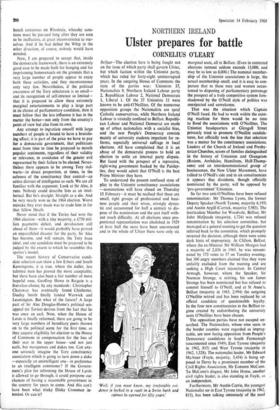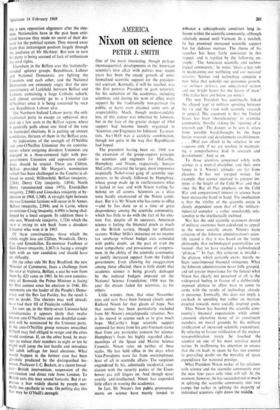Ulster prepares for battle
NORTHERN IRELAND CORNELIUS O'LEARY
Belfast—The election here is being fought not on the issue of which party shall govern Ulster, but which faction within the Unionist party, which has ruled for forty-eight uninterrupted years. In the outgoing House of Commons the state of the parties was: Unionists 37, Nationalists 9, Northern Ireland Labour party 2, Republican Labour 2, National Democrats 1, Liberal 1. Of the 37 Unionists 13 were known to be anti-O'Neillites. Of the numerous opposition groups the Nationalists are rpral Catholic conservatives, while Northern Ireland Labour is virutally confined to Belfast. Republi- can Labour and National Democrat are made up of utban nationalists with a socialist bias, and the new People's Democracy consists Mainly of university students impatient for re- forms, especially universal suffrage in local elections. All have complained that it is an abuse of the democratic process to hold an election to settle an internal party dispute. But faced with the prospect of a repressive, right-wing government backed by the Paisley- ites, they would admit that O'Neill is the best Prime Minister they have.
To understand the present confused state of play in the Unionist constituency associations —nominations will have closed on Thursday 13 February—it must be realised that these are small, tight groups of professional and busi- ness people and their wives, strongly dynas- tic and accustomed for half a century to dis- pose of the nomination and the seat itself with- out much difficulty. At all elections since pro- portional representation was abolished in 1929 at least half the seats have been uncontested and in the whole of Ulster there were only six `Well, if you must know, my irrefutable evi- dence is locked in a vault in a Swiss bank and cannot be opened for fifty years.' marginal seats, all in Belfast. (Even in contested elections turnout seldom exceeds 13,000, and may be as low as 8,000.) The nominal member- ship of the Unionist associations is large, the actual membership small, and it is easy to con- jecture that to these men and women accus- tomed to disposing of parliamentary patronage the prospect of a truly competitive system fore- shadowed by the O'Neill style of politics was unexpected and unwelcome.
That was the situation which Captain O'Neill faced. He had to work within the exist- ing machine for there would be no time to flood the associations with O'Neillites. The Unionist headquarters at Glengall Street privately tried to promote O'Neillite candida- tures, but officially took the line that selection was a- matter for the constituency associations. Leaders of the Church of Ireland and Presby- terianChurehes, scions of families distinguished in the history of Unionism and Orangeism (Rodeos, Archdales, Hamiltons, Hall-Thomp- sons) and an interdenominational group of businessmen, the New Ulster Movement, have rallied to O'Neill's side and in six constituencies it appears that dissidents, though officially nominated by the party, will be opposed by `pro-government' Unionists.
So far two anti-O'Neillites have been refused renomination : Mr Thomas Lyons, the former Deputy Speaker (North' Tyrone, majority 6,193) and Austin Argill (Carrick, majority 5,983). The inarticulate Member for Woodvale, Belfast, Mr John McQuade (majority, 1,724) was refused renomination by his selection committee, but managed at a general meeting to get the question referred back to the committee, which promptly reversed the decision, although there were some dark hints of impropriety. At Clifton, Belfast, where the ex-Minister Mr William Morgan had a majority of 2,836 in 1965, he was renomi- nated by 173 votes to 37 on Tuesday evening; but 300 angry members claimed that they were unfairly excluded from the meeting and are seeking a High Court injunction. In Central Armagh, however, where the Speaker, Sir Norman Stronge, is retiring, his son James Stronge has been nominated hitt has refused to commit himself to O'Neill, and at St Anne's, Belfast (majority in 1965, 2,994) the outgoing O'Neillite retired and has been replaced by an official candidate of questionable loyalty. M the four new constituencies in the Belfast re- gime created by redistributing the university seats O'Neillites have been chosen.
The opposition parties have not escaped un- scathed. The Nationalists, whose nine seats in the border counties were regarded as impreg- nable, are now facing opposition from People's Democracy candidates in South Fermanagh (uncontested since 1949), East Tyrone (majority in 1962, 815) and West Tyrone (majority in 1962, 1,528) The nationalist leader, Mr Edward McAteer (Foyle, majority, 3,454) is being op- posed in Deny by a prominent member of the Civil Rights Association, Mr Eamonn McCann. To McCann's disgust, Mr John Home, another' civil rights leader, is also standing in Foyle, as an independent.
Furthermore, Mr Austin Currie, the youngest Nationalist MP in East Tyrone (majority in 1962, 815), has been talking ominously of the need
for a new opposition alignment after the elec- tion. Nationalists have in the past been criti- cised because they made no secret of their dis- taste for the political system. They moved away from that intransigent position largely through the guidance of Mr McAteer. But now in turn his party is being accused of lack of enthusiasm for civil rights.
Elsewhere in the Belfast area the 'nationally- minded' splinter groups, Republican, Labour and National Democrats, are fighting the Unionists and each other, and the National Democrats are extremely angry that the new constituency of Larkfield, between Belfast and Lisburn, containing a large Catholic suburb, will almost certainly go to a Unionist (an O'Neillite) since it is being contested by NILP and Republican Labour also.
The Northern Ireland Labour party, the only traditional party to escape an upheaval, may pick up a few seats in the Belfast region, where it generally polls about one third of the vote in municipal electioris. It is putting up sixteen candidates, thirteen of them in the Belfast area.
As indications of the strength of O'Neillite and anti-O'Neillite Unionism the six constitu- encies where outgoing dissident Unionists arg engaged in a three-cornered fight with pro- government Unionists and opposition candi- dates should be crucial. These are Clifton, Belfast—provided Mr Morgan's nomination (which has been challenged in the Courts) is al- lowed to stand; Willowfield, Belfast (majority, 2,264); Derry City (majority. 1,014), North Derry (uncontested since 1953), Enniskillen (majority, 2,940) and Lisnaskea (majority at by- election in 1968, 1,300). A straight fight between the two Unionist factions will occur in St Annes, Belfast (majority, 2,994), and in Larne, where ex-minister Craig (majority, 6,090) is being chal- lenged by a local surgeon. In addition there is one seat, Woodvale (majority, 1,724) which the NILP is trying to win back from a dissident Unionist who won it in 1965.
Of these constituencies, those which the rebels might lose are Clifton, Woodvale, Derry City and Enniskillen. Ex-minister Faulkner at East Down (majority, 3,367) is facing a straight fight with an NDP candidate and should have no difficulty.
On the other side Mr Roy Bradford, the new Minister of Commerce, faces a challenge from the NILP at Victoria, Belfast, a seat he won from them by 423 votes in 1965. In his own constitu-, ency of Bannside the Prime Minister is facing his first contest since his election in 1946. His opponents are the leader of the People's Demo- cracy and the Rev Ian Paisley, but the result is not in doubt. The electors may well already have had their fill of Paisleyite rubbish.
To sum up, in the thirty-seven Unionist-held constituencies it appears likely that twelve known anti-O'Neillite,s and one doubtful candi- date will be nominated by the Unionist party. If the anti-O'Neillite group remains unscathed O'Neill may feel obliged to resign and the crisis would continue. If, on the other hand, he man- ages to reduce their numbers to eight or ten he might well jump the last hurdle and introduce full adult suffrage for local elections. What would happen in the former case has been gloomily predicted by the distinguished his- torian, Professor J. C. Beckett, in a recent broad- cast—British intervention, suspension of the constitution and direct rule from London. To British ears this may sound fantastic. But it ex- presses a fear widely shared by people nor- mally too apathetic to vote. On polling day this fear may be O'Neill's strength.



































 Previous page
Previous page